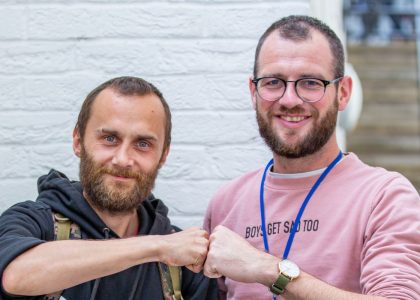Kerry works for St Basil’s in Warwickshire, a charity that supports young people aged 16-25 who are experiencing or at risk of homelessness. She works as a Progression Coordinator in the floating support team, which means that she supports young people to move onto their own independent tenancies.
The support Kerry and her team offer is varied. It ranges from budgeting support to life skills classes, to attending child protection meetings, working with probation officers and with the leaving care team – basically anything that their young people need to equip them to live independently.
“We do referrals to refuge, referrals for mental health. We help the young people register at GP surgeries and dentists. We try to get them back into engaging with the job centre.”
The team are very busy. A team of seven, each member of staff supports between 15 and 18 young people each. Unfortunately, there are referrals that they aren’t able to take on due to a lack of capacity, and in these cases, they will refer them to other services in the area.
“It’s quite demanding”
One of the biggest challenges for Kerry and her team is tackling young people’s reluctance to engage with their services. For a lot of young people who are experiencing homelessness, there is a history of poor interactions with authority figures, leading to a lack of trust. Working on building that trust is key, and has to happen before Kerry and her colleagues can work on getting their young people into homes.
“It’s not an easy task, and not something that happens overnight. I suppose you have to build that rapport.”
Another challenge impacting everyone Kerry works with is the cost-of-living crisis. The increased cost of gas and electricity is a huge issue for the people Kerry supports, as the majority are in low-paid jobs or using universal credit. And, as many of her young people are managing their own tenancies for the first time, there is the additional challenge of educating them on managing how much energy is used, and how to ensure their bills are paid on time. This, alongside the increase in food costs, has meant that the young people Kerry works with are using food bank vouchers “all of the time”.
Recently, Kerry has noticed an increase in the number of young people being referred to St Basil’s services. This has meant that accessing grants for things such as furniture and white goods has become extremely competitive. Funds that Kerry and her team would previously apply to that would be open Monday to Friday are now only accepting applications during short windows of just minutes per week. As well as this, St Basil’s own pot of funding is running dry due to demand.
Because of this, some of the young people are moving into properties that don’t have carpets or beds. When purchasing or accessing grants for furniture, white goods such as cookers, fridges and freezers are of course the priority – but this means the young people Kerry works with are left with houses that don’t feel like homes.
“We’ve moved a lot of people in that have slept on duvets on the floor. And though they’re excited to get their new property, it must be very disheartening for them, because that’s their home. That’s their safe place. Sometimes this is the first time they’ve felt safe in between four walls, and then they’re sleeping on a duvet.”
Kerry and her team often use grants from the Vicar’s Relief Fund (VRF) to access homes for the young people they work with. To secure accommodation, often a deposit and rent up-front is required, which Kerry notes is just not possible for so many people.
“The VRF is absolutely amazing for us. Our staff love using it. It’s really easy to apply for when our young people are in temporary accommodation, or sofa-surfing, and they’re bidding on properties.”
Whilst living in temporary accommodation or sofa-surfing, young people are often eating out due to a lack of facilities while paying rent. This makes it very difficult to save up the money for a deposit or rent-in-advance – meaning that without the VRF, they would be left without a home.
“They’d lose that property, they’d lose that fresh start, and they’d lose their home.”
When so many other grants are so difficult to access, Kerry’s team are happy that the VRF is still around, and easy to apply for.
“Being able to apply for the VRF really helps secure them into their home and we would be absolutely lost without it. It just secures a fresh start for our young people. It really does, and it’s just so easy. The application process is easy. Yeah, we’d be lost without it – don’t go anywhere!”
And while the VRF is helpful for Kerry and her team in their work, she emphasizes who the VRF is most valuable to – the young people they support.
“I can’t even say exactly how it really helps us. Only the young people could probably tell you exactly how it makes them feel.”





